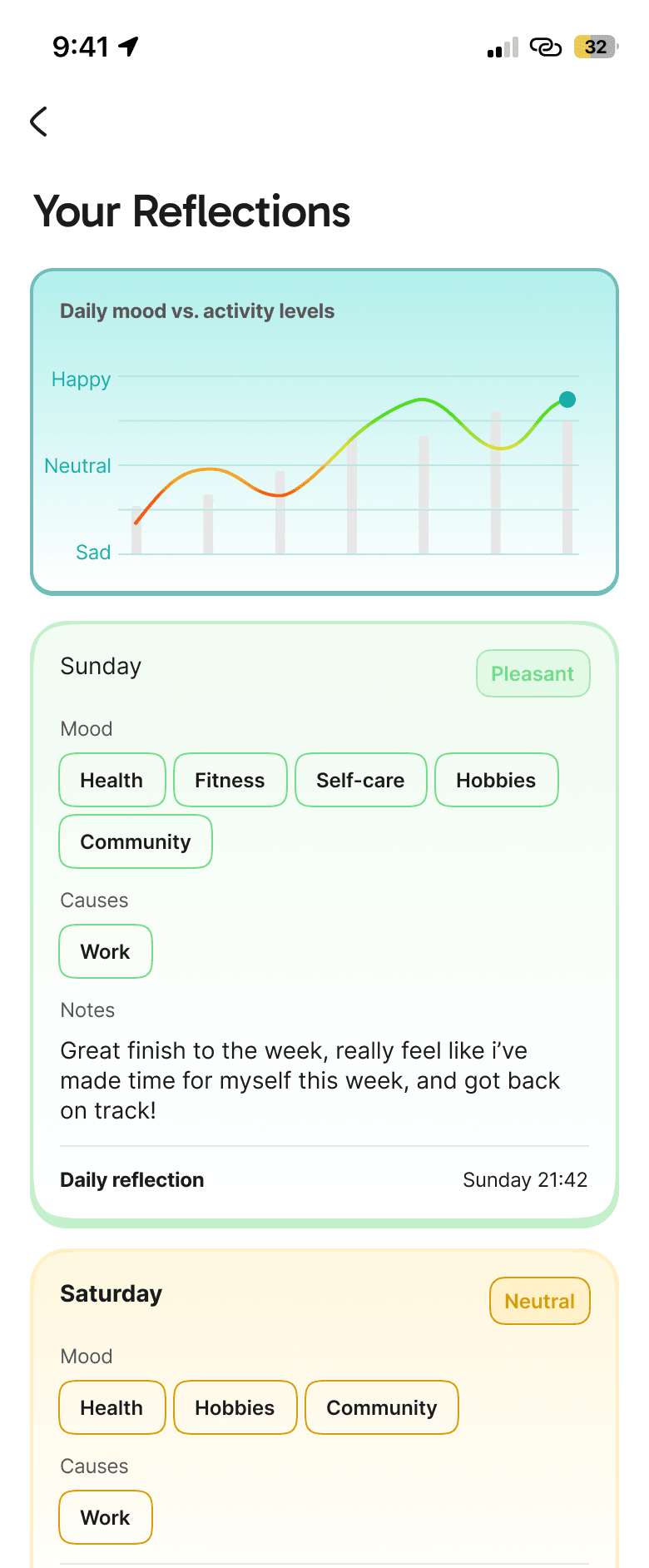Your Mood Improves With Just 15 Minutes of Movement
Science shows exercise is as effective as therapy for mild depression. Discover how Motion makes movement accessible on hard days, tracks your progress, and connects you with support when you need it most.

When Getting Out of Bed Feels Like Climbing Everest
You know exercise would help. Everyone says so. Your therapist recommends it. The internet swears by it.
But when your mental health is struggling, "just go for a run!" feels like being told to "just be happy!"
The Catch-22 of Exercise and Mental Health
The Energy Problem: Depression steals your energy. Anxiety exhausts
you. But exercise requires... energy.
The Comparison Trap: Instagram shows perfect people doing perfect
workouts. You can barely shower. This helps how?
The Motivation Paradox: Mental health struggles destroy motivation.
But you need motivation to exercise. Cool, cool, cool.
The Shame Spiral: Skip one day, feel guilty. Skip a week, feel worse.
Delete app, pretend you never tried.
Here's What Most Fitness Apps Don't Understand
When you're struggling mentally, you don't need another source of pressure. You don't need impossible goals or toxic positivity.
You need compassion, flexibility, and proof that even tiny movements count.
You need to see that 5 minutes of movement on your worst day is a bigger victory than someone else's marathon.
The Science Is Overwhelming: Movement IS Medicine
Just How Powerful Is Movement for Mental Health?
Harvard's Game-Changing Study: 15 minutes of running or 1 hour of
walking reduces depression risk by
26%.
That's not a typo.
Better Than Medication (Sometimes): Duke University found that 16
weeks of exercise was as effective as
antidepressants for major
depression in some patients, with lower relapse rates.
The Anxiety Antidote: Just 5 minutes of aerobic exercise can start
anti-anxiety effects. Five.
Minutes.
The Brain Chemistry:
- Endorphins: Natural mood lifters (the famous "runner's high")
- Serotonin: Increased production helps regulate mood
- BDNF: (That's Brain-Derived Neurotrophic Factor) Exercise boosts this "Miracle Gro for the brain"
- Cortisol: Movement helps regulate this stress hormone
Why Even Tiny Amounts Work
Research from the University of Vermont found that just 20 minutes of exercise can boost mood for up to 12 hours.
You don't need to become a fitness influencer. You just need to move a little, consistently.
How Motion Makes Movement Accessible on Hard Days
1. Track the Connection: Your Mood Journal Meets Fitness Tracker
Motion's unique mood tracking feature lets you:
- Log your mood with daily check-ins (takes 5 seconds)
- See your mood trends over time
- Discover YOUR personal mood-movement connection
Most users are shocked to see the correlation. Bad days often follow inactive days. Good days cluster around movement. Seeing this pattern is powerful motivation.
2. Goals That Understand Mental Health
Motion's effort-based goals adjust to your reality:
- Struggling this week? Your goal gently decreases
- No shame for bad days - the system expects them
- Celebrate showing up, not just achieving
- 5 minutes counts just as much as 50 when you're struggling
3. The Comparison Cure
Traditional fitness apps: "Your friend Sarah ran 10 miles!". You: Deletes app
Motion: "You hit 100% of YOUR goal. Sarah hit 100% of hers. You both win!". You: Actually feels accomplished
No more feeling inadequate because others are fitter. Your battles are based on effort, not absolute fitness.
4. Never Alone on Hard Days
The Motion community includes thousands who understand mental health struggles:
- Depression support channel where "I walked to the mailbox" gets celebrated
- Anxiety buddies who understand exercise panic
- No toxic positivity - real support for real struggles
5. Your Digital Support System
Your Motmot provides non-judgmental accountability:
- They're sad when you don't move, not angry
- They celebrate tiny victories enthusiastically
- They give you purpose beyond yourself
- Users report this external motivation helps on days when self-care feels impossible
6. The Data That Motivates
Seeing objective proof that movement helps YOUR mood is powerful:
- "I'm 40% happier on days I hit my goal"
- "My anxiety is lower after just 10 minutes of movement"
- "My 3-day moving average mood increased 2 points!"
This isn't generic advice. It's YOUR data proving movement works for YOU.
Mental Health-Friendly Ways to Start Moving
When Everything Feels Hard: Start Here
The 2-Minute Rule: Commit to just 2 minutes. That's it. Often,
starting is the hardest part. If you stop at 2 minutes, you still
succeeded.
The Bedroom Dance Party: Put on one song. Move however feels good. No
rules, no structure, just movement.
The Fake Commute: Work from home? Walk around the block to "commute."
Creates routine when depression destroys structure.
The Buddy System: Find one person in Motion's community who gets it.
Check in daily. "I moved today" is enough.
The Mood Minimum: Set your "bad day minimum" - maybe it's 500 steps.
Anything above zero counts on hard days.
Building From Your Baseline
Week 1: Just track your natural movement and mood
Week 2: Add 5 minutes on good days
Week 3: Notice patterns in your mood data
Week 4: Slightly increase your "minimum"
Week 8: Realize you're consistently moving more AND feeling better
This isn't about becoming an athlete. It's about finding YOUR sustainable level of movement that supports YOUR mental health.
Frequently asked questions
If you have anything else you want to ask, reach out to us.
Can exercise really help with depression and anxiety?
Absolutely. Harvard research shows regular exercise can reduce depression risk by 26%, and many studies find it as effective as medication for mild to moderate depression. However, always work with healthcare providers for clinical conditions - exercise complements but doesn't replace professional treatment.
How does Motion's mood tracking work?
Daily, Motion prompts you to rate your mood (takes 5 seconds). Over time, you'll see graphs showing your mood trends alongside your activity levels. Most users discover clear patterns - more movement correlates with better mood. It's YOUR data proving what works for YOU.
What if I'm too depressed to exercise?
Start impossibly small. Motion counts EVERYTHING - walking to the kitchen, gentle stretching, even dancing to one song. Our adaptive goals adjust to your capacity. Some days, 100 steps is a massive victory, and Motion celebrates it as such.
How quickly will I notice mood improvements?
Many people feel better immediately after moving - research shows mood boosts can last up to 12 hours from just 20 minutes of exercise. For lasting mental health improvements, studies suggest 2-4 weeks of regular movement shows significant benefits.
Is the community really supportive about mental health?
Yes. Our community includes thousands dealing with depression, anxiety, and other challenges. There's zero judgment for bad days, celebrating 'small' victories is the norm, and toxic positivity is actively discouraged. You'll find people who truly understand.
What type of exercise is best for mental health?
ANY movement helps! Research shows both aerobic exercise (walking, dancing) and resistance training improve mood. Motion counts everything equally, so do what feels manageable. Gentle yoga on bad days counts just as much as running on good days.
Can I use Motion alongside therapy or medication?
Absolutely! Motion complements professional treatment perfectly. Many therapists recommend tracking mood and movement. You can even share your Motion mood data with your healthcare provider to show objective progress. Always follow professional medical advice.

